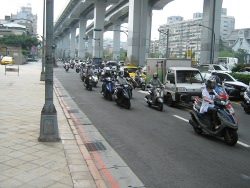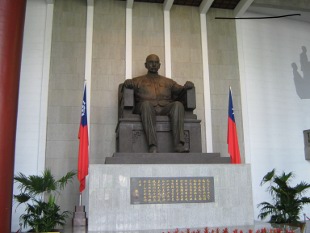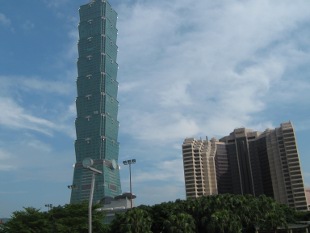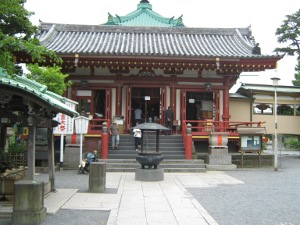Think of this as Volume 12, Number 23 of A-Clue.com, the online newsletter I've written since 1997. Enjoy.

I am covering the CompuTex show in the capital of Taiwan, Taipei. You can read my coverage at ZDNet Open Source and at ZDNet's new blog, SmartPlanet, where I co-write the Smarter Tech blog and solo on their Smarter Health.
Here, however, I want to talk about what I have learned about Taiwan, about what differentiates it from Chengdu, and what that may say to the rest of us.
My first impressions of the place were dirty. The overpasses are older, the buildings all older, than on the mainland. Taipei has been a modern city for over half a century. This should not have been a shock. But after all the construction of new highways, office towers, and condominium complexes in Chengdu it was.
The Taipei air is also dirty. You can't get along on a bicycle here. You're either in a car or on a motorcycle. A motorcycle is better, because you can park it on the sidewalk. With a car you need to find a lot, which is expensive. Every light change is met by the roar of dozens of motorcycle engines. Many people wear masks against the soot, but that is of no help against the other pollutants they are making.

Once we got acclimated, and the hyper-modern Miramar Garden Hotel helped a lot in that, we learned about the various boxes Taiwanese must live in.
There is the box of China, which claims Taiwan as its own, and which dominates national politics. There is the box of America, Taiwan's chief market, which its businessmen and politicians must both serve and stay clear of. There is the box of history, which we found on visiting the Sun Yat Sen Memorial, which tells a story of revolution and pain and features a statue of the great man on a scale, and in a pose, familiar to all who have visited the Lincoln Memorial.
There is the boxed lunch, which Taiwanese workers eat at their desks on their long workdays. There are box-like apartments, most without air conditioning in a nation that shares latitude with Hawaii. There is the boxiness of its language, a traditional Chinese far more elaborate than the simplified version of the mainland.

Taipei 101 features a half-dozen floors of the finest luxury goods worldwide, along with a large food court, and foreign theme restaurants in an atrium above.
Next door is another way out of the box, a middle-class shopping center called New York New York, with a Mister Donut, a large Starbucks, and American fashions. I always wondered what my home would look like if seen as exotic. Now I know.
There are ways out of the box. English is one. Fashion is another. Consumer goods work well. The Internet helps. Airplanes work best. Many more Taiwanese have been abroad, many for far longer than any mainlander. They are not awed by the modern world, and more seem anxious to explore their own Chinese nature, to feel at home in the box. Another word for a box can be home.
Of course, we all live in boxes, usually of our own making. That's a lesson staying in Taiwan for a week brings home.
Americans can break out of their boxes more easily than Taiwanese can, but it's still difficult. I have this trouble, my son has this trouble, all of us have it.
What makes Americans seem special to people everywhere else is the ease with which we seem to break out of our boxes, inventing and reinventing ourselves. But most of those boxes remain American boxes. They are are boxes within a larger box.
It's the struggle to break free of their box that makes the Taiwanese special people. Given their place in the world an outsider may think it's natural for them. It's not. It's just as difficult as it is for the rest of us.
And we should all do it more often.










